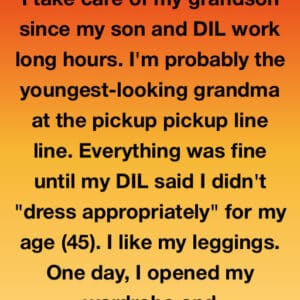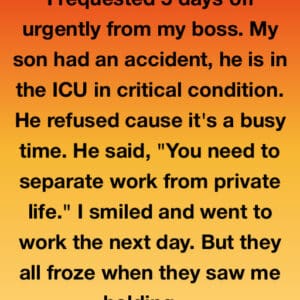I was elbow-deep in potato salad on a soft spring Sunday when life quietly unstitched itself. Marcus was on the porch, coaxing smoke and sizzle out of the grill. The air smelled like lemon and charcoal and easy plans. Then came the knock.
Darlene stood there in a pastel church suit with matching shoes and a smile stretched tight enough to squeak. She pressed a Tupperware of lemon bars into my hands like an offering and clasped my fingers like we were about to pray.
“Sweetheart,” she said, eyes bright. “I’ve prayed on this for months. The Lord told me I’m meant to be a mother again.”
I laughed—then realized she wasn’t joking.
“You’re fifty-three,” Marcus said, deadpan.
She lifted her chin. “Age is just a number. I found a clinic. But I want you to carry the baby, Ember.”
Behind me, Marcus froze mid-bite, steak hovering like a question mark. I stared at her, at the flawless lipstick and earnest eyes, and felt my brain skid. “Darlene, I can’t keep a succulent alive.”
That should have ended it. It didn’t. She called, she cried, she showed up outside a co-op I contract for and dissolved into mascara and scripture. “You’d do it for your own mother, wouldn’t you?” she whimpered. “I thought you loved your family.”
Guilt is a lever. She knew exactly where to push.
“She needs therapy, not a baby,” Marcus said one night, rubbing his temples. He was right. And yet when she cornered me in the kitchen after dinner, voice shaking—“You could give me a reason to live again”—something in me softened in all the wrong ways.
I nodded.
The IVF worked on the first try. The clinic called it a miracle; Darlene called it divine confirmation. I called it surreal. She came to every appointment with ginger tea and chocolate chip cookies, rubbing my belly like it belonged to her. “My baby,” she cooed, voice pitched high. “Growing through you. You’ll look like me, little angel. I’ll make sure of it.”
Marcus snapped once in the OB waiting room. “Mom, stop.”
She laughed. “Don’t be dramatic. I’m manifesting.”
Manifesting became her shield for everything boundary-crossing. She posted my bump on Facebook, tagged me, signed “—Mama Darlene 2.0.” And yet, late nights in bed with a hand on my stomach, listening to hiccups and kicks, I started talking to her. I started choosing lullabies and names. I started thinking of the baby as mine.
Labor came fast, like the floor giving way. At 3 a.m., Marcus drove through red lights while I breathed and swore and bargained. Nine hours later, they placed a tiny, perfect girl on my chest—full head of dark hair, a nose like a comma. Something in me split open and flooded with light.
Darlene’s face changed. She studied the baby like a returns clerk inspecting a dent. “There must be some mistake,” she murmured, and before I could say a word she lifted my daughter from my arms. “I’ll take her home for bonding time.”
I was bleeding and dizzy and Marcus was tangled in discharge papers. By the time we got home, she was gone.
No answer at her house. Curtains nailed shut with sunlight. No returned calls. I sat on the edge of our bed and shook, my body hollowed and aching with milk and absence. Marcus called every relative. He threatened to call the police. But the surrogate contract listed Darlene as biological guardian. Without new orders, our hands were tied.
I hated myself for saying yes. I hated her for asking.
A week later, there was a knock. A tall man in a navy suit stood on our porch, a briefcase in one hand and my baby in the other. My legs went weak.
“Mrs. Whitmore?” he asked softly.
“Yes.” My eyes were on the bundle.
“I’m Mr. Greene. I represent Ms. Darlene.”
“Where is she?” Marcus demanded, coming up behind me.
He exhaled. “She cannot keep the baby. She says she can’t raise her because the child looks too much like you. She is filing a claim against you for emotional damages and demands two hundred and fifty thousand dollars. I’m here to deliver the terms—and the child.”
I didn’t hear the rest. He placed my daughter in my arms, warm and real and breathing, and I slid to the hallway rug and wept into her hair. Marcus knelt beside me, hand steady on my back.
“She’s safe now,” he whispered. “We’ll fight the rest.”
We hired Lillian, a lawyer who wore combat boots with her suits and had a voice like a seatbelt click. “She wants emotional distress?” she snorted. “Watch.”
Court came fast. I didn’t sleep the night before; I lay listening to my daughter—Mila, after my grandmother—sigh in her bassinet. In the courtroom, Darlene’s chair was empty. Her lawyer cleared his throat. “Ms. Darlene is unavailable due to personal wellness obligations overseas.”
“Convenient,” Marcus muttered.
He read a statement about trauma and resemblance and the unbearable burden of a child who didn’t mirror her. The judge’s eyebrow twitched. Lillian stood, slid a thick folder across the table—clinic records, consent forms, DNA results, a timeline, voicemails of Darlene’s honeyed pressure, messages tagged “Mama Darlene 2.0.”
“And, Your Honor,” Lillian added, “news reports and legal documents confirming Ms. Darlene is under federal investigation. Her ‘retreat’ is tied to a fraudulent wellness group flagged for money laundering and spiritual coercion. Accounts frozen. Person of interest.”
Silence took a seat with us. Darlene’s lawyer shuffled papers. “We weren’t aware—”
The judge leaned forward. “This case should never have reached my courtroom. Ms. Darlene’s claims are baseless. The court rules for Ms. Whitmore. This matter is closed.”
The sound I made wasn’t a sob so much as a body remembering it can breathe. We gathered our things. As we reached the door, Mr. Greene approached, less steel than before. He held out a pale blue envelope with my name in shaky cursive.
“She asked me to give you this,” he said.
The letter was short.
Ember, I cannot face the truth. All I wanted was money, not a baby to carry my name. My selfishness and greed blinded me. Maybe I thought if I erased what I saw in you, it would fix me. I failed. You carried this child for nine months. She is yours. You will be a better mother than me. I am left with the consequences of my pride and cruelty. —Darlene
I folded it and slid it into my purse. Relief and anger and something like pity flashed through me and disappeared. People aren’t characters you can rewrite. Babies aren’t prizes.
That night, we lay on the couch with Mila between us, swaddled in a yellow blanket. Marcus traced a finger along her cheek. “She’s ours,” he said, almost to himself. “Always.”
Mila smiled in her sleep—a little corner-of-the-mouth twitch that felt like a benediction. I kissed her hair. “You were never a mistake,” I whispered. “You were always ours.”
In the months that followed, Darlene formally relinquished her rights. The last papers cleared; the state named me what my heart already knew—mother. We learned how to be parents in the ordinary, holy ways: walking slow under trees, introducing her to Luna, our dog, laughing when she scrunched her nose like a tiny judge. I found my spine in places I didn’t know I had one. I stopped apologizing for taking up space.
Sometimes I think about that Sunday—the lemon bars sweating under cling film, the smile too bright, the fingers that gripped mine like they owned the future. I think about how easily pity can dress up as compassion and walk you into a trap. And then I look at Mila, the light that cut through the smoke, and I know this: the story changed me. I am not the woman who said yes because it was easier than saying no. I am the woman who did the hard thing when it mattered, who learned that love is a boundary as much as it is a gift.
One evening, after the final court notice arrived and the last knot untied, we stepped out onto the porch. The air smelled like rain on hot pavement. Marcus slid his arm around my waist. Mila slept against my chest, all warmth and trust and steady breath.
“You okay?” he asked.
I nodded. “I am now.”
Across the yard, the wind lifted the chimes and they sang—clear and simple, like a house remembering its own quiet. Inside, the lemon bars were long gone, the pastel suit a memory I no longer had to carry. In my arms was the only future that mattered, heavy and perfect and exactly where she belonged.





